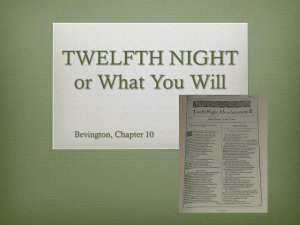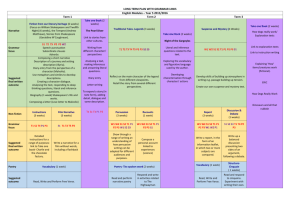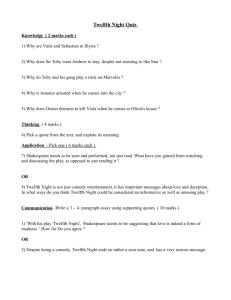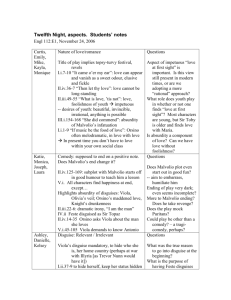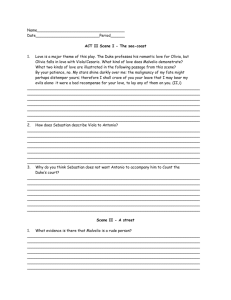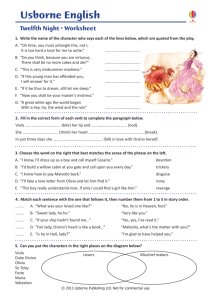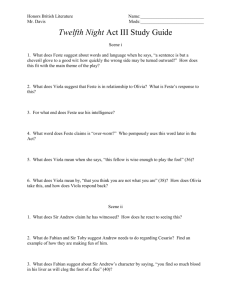"M.O.A.I." Trying to Share the Joke in Twelfth Night 2.5 (A Critical
advertisement
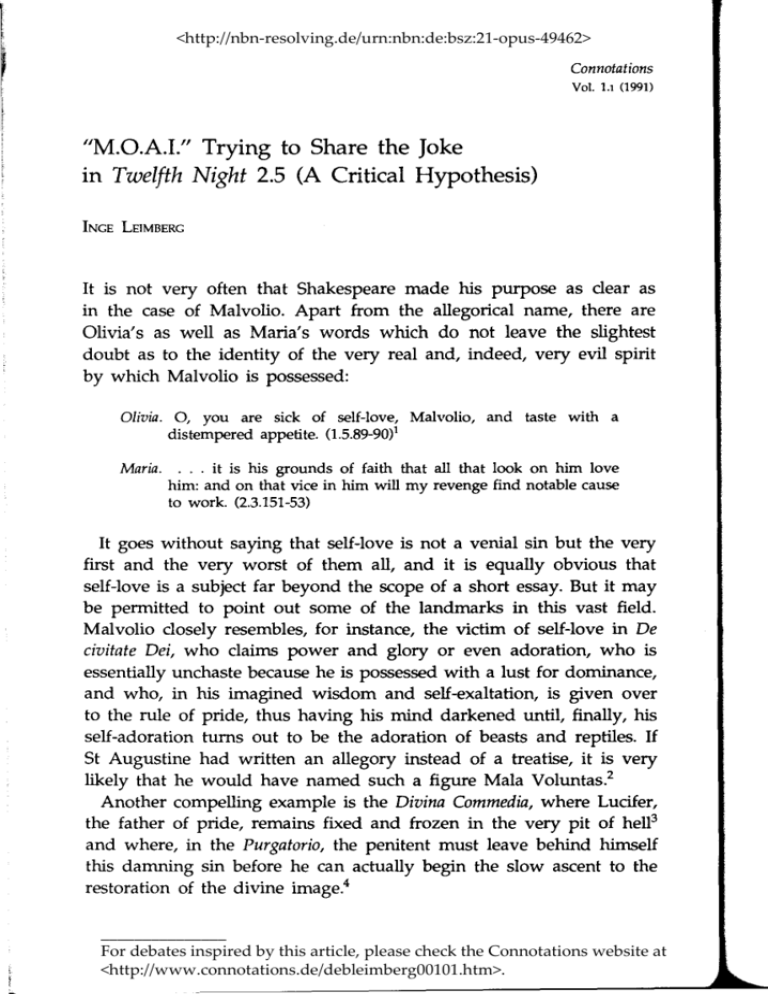
<http://nbn-resolving.de/urn:nbn:de:bsz:21-opus-49462>
Connotations
Vo\. 1.1 (1991)
"M.O.A.I." Trying to Share the Joke
in Twelfth Night 2.5 (A Critical Hypothesis)
INCE LElMBERC
It is not very often that Shakespeare made his purpose as clear as
in the case of Malvolio. Apart from the allegorical name, there are
Olivia's as well as Maria's words which do not leave the slightest
doubt as to the identity of the very real and, indeed, very evil spirit
by which Malvolio is possessed:
Olivia. 0, you are sick of self-love, Malvolio, and taste with a
distempered appetite. (1.5.89-90)1
Maria. ... it is his grounds of faith that all that look on him love
him: and on that vice in him will my revenge find notable cause
to work. (2.3.151-53)
It goes without saying that self-love is not a venial sin but the very
first and the very worst of them all, and it is equally obvious that
self-love is a subject far beyond the scope of a short essay. But it may
be permitted to point out some of the landmarks in this vast field.
Malvolio closely resembles, for instance, the victim of self-love in De
civitate Dei, who claims power and glory or even adoration, who is
essentially unchaste because he is possessed with a lust for dominance,
and who, in his imagined wisdom and self-exaltation, is given over
to the rule of pride, thus having his mind darkened until, finally, his
self-adoration turns out to be the adoration of beasts and reptiles. If
St Augustine had written an allegory instead of a treatise, it is very
likely that he would have named such a figure Mala Voluntas. 2
Another compelling example is the Divina Commedia, where Lucifer,
the father of pride, remains fixed and frozen in the very pit of hell3
and where, in the Purgatorio, the penitent must leave behind himself
this damning sin before he can actually begin the slow ascent to the
restoration of the divine image.4
_______________
For debates inspired by this article, please check the Connotations website at
<http://www.connotations.de/debleimberg00101.htm>.
"M.O.A.!."
79
Thirdly, in Shakespeare's own days self-love was nothing less than
an obsolete kind of error. Montaigne described a Malvolio-like man
when he wanted to expose the wrongness of human self-adoration.5
When, only a little later, it comes to the "grounds of faith" of Roman
Catholic reformers like Fran<;ois de Sales, the message is much more
in harmony with Shakespeare's Christian humanism than is the acid
Pyrrhonism of Montaigne. It is an added charm to Salesian preaching,
and a witty device very much akin to Shakespeare's comic riddles,
that the Introduction a la vie devote was also known under the name
Philothea. It was obviously an understood thing that Fran<;ois' readers
measured up to recognizing in the desired philo-thea the despised
phil-autia against which the exhortation of the work is aimed.6 What
self-love may do to a man had, of course, been amply and ironically
shown by Erasmus in the Laus Stultitiae, where Philautia officiates
as star-assistant to that goddess. According to Erasmus, Philautia, i.e.,
self-love or self-conceit, is always the first step in a human creature
being metamorphosed into an ass?
Finally, John Donne's paradoxical definition of amor sui must not
be ignored in an interpretation of Twelfth Night: Trying to act in
accordance with God's will as regards amor sui, says Donne (the
preacher), man has not simply to respect a prohibition but to become
aware of a dilemma. Self-love must not be replaced by self-contempt;
or, in other words, man is strictly forbidden as well as commanded
to try and be like God:
. . . whereas it was the greatest trespasse, of the greatest trespasser in the
world, the Devill, to say Similis era Altissimo, I will be like the Highest, it
would be as great a trespasse in me, not to be like the Highest: not to
conforme my selfe to God, by the use of his grace, in the Christian Church.
And whereas the humiliation of my Saviour is in all things to be imitated
by me: yet herein I am bound to depart, from his humiliation; that whereas
he being in the forme of God, tooke the forme of a servant; I being in the
forme of a servant, may, nay must take upon me the forme of God, in being
Deiformis homo, a man made in Christ, the Image of God. s
When Shakespeare made Malvolio fall victim to self-love, he moved
in the field roughly defined by these different examples. The pattern,
however, which will prove to be most helpful in an interpretation
of Malvolio is the tripartite one described in De civitate Dei: Self-love
80
INGE LEIMBERG
is only another name for unchastity, it leads to intellectual blindness,9
and, therefore, brings about the loss of man's likeness to God, which
was God's very purpose in the creation of man. In Twelfth Night 2.5
Shakespeare is mainly concerned with intellectual blindness, whilst
the unchastity of self-love comes to the fore even more clearly in
Twelfth Night 3.4. Man's likeness to God, being the acme of the whole
thematic complex, is always involved.
If, in Twelfth Night, Shakespeare branded self-love as the sickness
and the sin of Malvolio, he went even further in Sonnet 62,10 where
the speaker himself is a victim of amor sui. But, by contrast with
Twelfth Night, in the sonnet the ego possessed by self-love is never
quite bereft of self-knowledge. In the octave the speaker confesses
to his guilt:
Sin of self-love possesseth all mine eye,
And all my soul, and all my every part;
And for this sin there is no remedy,
It is so grounded inward in my heart.
Methinks no face so gracious is as mine,
No shape so true, no truth of such account,
And for myself my own worth do define,
As I all other in all worths surmount.
In the sestet, after the peripeteia-like volta, he describes his bitter
awakening to reality:
But when my glass shows me myself indeed,
Beated and chopped with tanned antiquity,
Mine own self-love quite contrary I read;
Self so self-loving were iniquity.
Then comes the final couplet extolling the transformation of self-love
and self-praise into real love and real praise, which is only another
name for poetry:
'Tis thee, myself, that for myself I praise,
Painting my age with beauty of thy days.
The autobiographical parallel in the sonnet, which goes as far as
we shall ever come towards autobiography in Shakespeare, makes
Malvolio's tragi-comic catharsis poignantly clear to any spectator and
"M.O.A.!."
81
hearer of Twelfth Night. While, in the sonnet, self-love is set off
against the speaker's passionate self-castigation as well as his trust
in the redeeming power of unselfish love, in Malvolio the evil passion
of self-love reigns supreme. He sees nothing but illusions, no matter
whether he looks with his mind's eye into his own heart or with his
real eyes into a real mirror, or whether he witnesses his relations with
other people, be they socially above or below him, be they men or
women.ll But it is, of course, a woman who becomes the final
stumbling-block for a man suffering from Malvolio's disease. Love
is blind, and self-love in love, or rather infatuation with a woman
(who, necessarily, has to be a great lady) is doubly blind. Selfknowledge is one of the redeeming features of the distressing story
told in Sonnet 62. And it is largely due to the self-lover's complete
lack of self-knowledge that we are moved to pity and terror as well
as laughter in Twelfth Night 2.5.
Both Sir Toby and his companions on the stage as well as the
audience take part in what to Malvolio is an overwhelming discovery:
· . . let me see, let me see, let me see
he says (2.5.113). The letter he has before him, in his Lady's own handwriting, sealed "with her Lucrece" and ringing with her "very
phrases," speaks to him in terms which are
· .. evident to any formal capacity. There is no obstruction in this.
(118-19)
Daylight and champaign discovers not more! This is open. . ..
(160-61)
· . . I do not now fool myself, to let imagination jade me; for every
reason excites to this, that my lady loves me. (164-66)
Whilst the poor man afflicted with the disease for which "there is
no remedy" exults in his being at last undeceived that his lady adores
him, the spectators on the stage make it quite clear that the very
undeceiving is a deception. And this is the main cause of their
laughter. Of course, Malvolio is a comic figure in the tradition of the
miles gloriosus or the mercator in Plautus; but it is only later in the
,t
I
I
82
INGE LEIMBERG
play, in Scene 3.4, that he will display the mad antics of the imaginary
lady-killer and the old-man-in-Iove. In 2.5 we are not yet concerned
with his strutting about in yellow stockings but with his reading the
letter trying to "see . . . see . . . see" with the eyes of a mind
hopelessly blinded by self-love.
It is not enough that Shakespeare presents Malvolio as the reader
of a letter as well as of combinations of single letters, he also makes
him scan the nurnbers12 of Maria's verses as well as reason along the
lines of textual exegesis. He sees himself in the role of a schoolrnan
applying the rules of analysis (118). He is sure of his findings (11819). He is well aware that the riddle given him to solve is an
"alphabetical,,13 one (120). Finally, he tries to find a tertium comparationis as if St Thomas Aquinas himself had shown him the way
to understanding (121). When he applies his method, however, every
onlooker knows what Sir Toby and his companions speak of and
rejoice at:
He is ... at a cold scent. (123)
... the cur is excellent at faults. (128-29)14
Ay, and you had any eye behind you, you might see more detraction
at your heels than fortunes before you. (136-38)15
Malvolio is completely deprived of self-knowledge and that is what
scene 2.5 is mostly about and what, together with Sir Toby and Sir
Andrew and Feste and Fabian, we are meant to laugh at, though,
hopefully, being struck at the same time with pity and terror by the
spectacle of a man who repeats the sin of Mother Eve in drinking
the poison of the Tempter (114). Malvolio, for all his passionate efforts
to "see ... see ... see;' is blind to what every one else sees dearly
because it is indeed as revealing as "Daylight and champaign"; he
is virtually illiterate, unable to read the very ABC of self-knowledge
spread out before his eyes. "There, but for the grace of God, goes
. . . ,If the terrified understand er of Twelfth Night says to himself,
brushing away the tears of laughter all the same. What wonderful
comedy, the best ever written! But what a terrible spectacle, too, of
"M.O.A.!."
83
Everyman's downfall brought about by his most degrading and, alas,
most common fault, the "Sin of self-love . . .."
All this would be lost on the spectator if he did not see clearly what
Malvolio misreads. Shakespeare, hearing Sir Toby's prayer and making
Malvolio read the letter aloud, makes him repeat four times the
fourfold "alphabetical position" which proves to be the fatal ingredient
in the "dish of poison" concocted by Maria:
M.O.A.I. doth sway my life. (109)
'M.O.A.I. doth sway my life.'-Nay, but first let me see, let me see,
let me see. (112-13)
Softly: 'M.O.A.I.'- (122)
'M.O.A.I.' ... to crush this a little, it would bow to me, for every one
of these letters are in my name. (139-41)
In all the broken soliloquy from the first mention of "M.O.A.I." to
the last, Malvolio is mainly concerned with the solution of this riddle.
So are his spectators on the stage who, in lieu of a chorus, are helping
the audience along with understanding, in their turn, what the fourtimes repeated "tetragrammatic" pattern means, namely, something
completely different from or even opposite to what it means in
Malvolio's madly wishful thinking.
If we don't see the joke, there is none, apart from the mad antics
the actors may happen to perform. It mostly depends on this joke
whether whatever happens to Malvolio is felt to be meaningful, be
it in the narrower or wider context of the play. Therefore, when I
read in the Arden Edition that we should stop worrying because
Shakespeare's purpose in all the "ado" about ''MD.A.I.'' is mainly
"prolonging the comic scene,,,16 I can only say, with Feste and some
others in Shakespeare: "0 no, no, no, no" (2.3.112) and begin listening
to the rogues who are hidden in the box-tree, busily providing
comments for the benefit of the audience there below. "0 ay," says
Sir Toby (2.5.123). When, a little later, Malvolio argues "'A' should
follow, but '0' does," Fabian comments, "And '0' shall end, I hope"
(131-33). Sir Toby goes on repeating "0" and "Ay," but now in
84
INGE LEIMBERG
reversed order: "Ay, or I'll cudgel him, and make him cry 'O'!" Then
Malvolio reaches the final "1" of the formula and Fabian clinches the
argument by adding to "ay" and "eye" the [ju:] which Oiterally as
well as figuratively) is absent from Malvolio's egotistic alphabet.
Furthermore, he implicitly draws a comparison with Lot's wife,
insinuating that Malvolio would have shared her fate of being turned
into a pillar of salt if he had any eye behind him (136 and Gen. 19:17,
19:26).
The clearest of all these "alphabetical" pointers is Fabian's "And
'0' shall end, I hope," emphasized by Sir Toby's reordering his former
"0 ay" into "Ay . . . 'O'!" Surely these hints refer to the Greek
alphabet which, indeed, ends with "0." What Malvolio ought to have
seen at a glance (as the chorus in the box-tree do) is his own image
mirrored in a very simple anagram reflecting the creed of man fallen
off from the love of God and thrown into the outer darkness of selflove: "Eritis sicut deus," says the devil, and Adam homo promptly
replies: I'M A & 0!17
If only Malvolio had bothered to "crush this a little" (140) as it ought
to be crushed, the four letters must, indeed, have hurt him "like a
Lucrece knife" (107), wounding his self-love, or, in other words, his
unchastity (be it sensual or spiritual) to the core. If only he had looked
in the right direction (the letters themselves) instead of the wrong
one (the distorting mirror of his own name) he might have remembered what happened to Lot's wife who also wanted to "see ... see
... see" and, against God's command, looked backward. In Malvolio's
case, this means that he looks at his own image with the eyes of selflove, and is, therefore, incapable of learning the lesson which is
contained in the letter.
There is, in the annals of the English-speaking theatre, a direct
(though comparatively harmless) lineal descendant of Malvolio: Henry
Higgins in the musical version of Shaw's Pygmalion. The librettist
applies to him precisely the old formula which exposes the moral
blindness of the eternal self-lover who "thinks he is a god," i.e., Alpha
and Omega:
No, my reverberating friend,
"M.O.A.I."
85
sings Eliza, giving Henry Higgins the brush-off and preferring
Freddie,
You are not the beginning and the end!
Surely Shakespeare's audience was expected to catch the meaning and
to share Maria's joke as, even in the literary amnesia of our own age,
some people are supposed to know what Eliza Doolittle thinks she
is talking about in that line: A man to be imagined with the letters
"M.O.A.I." (or the other way round) hovering in a balloon above his
head.
To summarize: "M.o.A.I." is an anagram (and a very simple and
obvious one at that) of Rev. 1:8. 18 As such it is an ironic pointer to
Malvolio's ruling passion, self-love, which is only another name for
superbia or mala voluntas. 19 Thus, temptation comes to him (as it
came, for instance, to Or Faustus or to fair Rosamond)20 as an
unmistakable warning. The spectators on the stage grasp that meaning
at once and keep giving alphabetical hints to the audience and heading
them off the false scent followed by Mavolio.
The method and the substance of this interpretation are supported
by an alphabetical pattern quoted by Erasmus in the Laus Stultitiae.
It comes up in connection with the folly of an old-man-turned-Iover,
who is one of Malvolio's typical literary forbears. According to
Erasmus (speaking tongue in cheek) the old man, otherwise a sad
figure, is graced by the goddess Stultitia with this folly which makes
him sociable for a little while, when otherwise he would merely be
shunned:
Itaque delirat senex meo munere. Sed tamen delirus iste meus interim
miseris illis curis vacat, quibus sapiens ille distorquetur. Interim non
illepidus est compotor. Non sensit vitae taedium, quod robustior aetas vix
tolerat. Nonnunquam cum sene Plautino ad tres illas litteras revertitur,
infelicissimus si sapiat ... (26).
Shakespeare, writing for the comic stage where words have to be
grasped instantly, contents himself with a simple anagram of a very
terse and very well-known formula which he repeats four times,
helping the audience on with all sorts of pointers. Erasmus, on the
86
INGE LEIMBERG
other hand, can afford to provide an elliptical, merely allusive pattern,
being very sure that his readers have enough leisure to identify the
Plautinian old man as Demipho in the Mercator and "these three
letters" as AMO. This is the passage to which Erasmus refers:
Dem. Sed ausimne ego tibi eloqui fideliter?
Lys.
Audacter.
Animum advorte.
Lys.
Fiet sedulo.
Dem. Hodie ire in ludum occepi litterarium,
Lysimache. temas scio iam.
Lys.
Quid temas?
Dem.
Dem.
AmO.
21
Add to the three letters AMO the letter I, and you have an absurd,
macaronic version of amor sui (the perversion of amor Dei) together
with the alphabetical distortion of the divine "I am A and
Apart from referring to the tres litteras in Plautus, that passage in
the lAus Stuititiae is preceded by another one which points to the
latinized alpha in Shakespeare's double-barrelled satire, including the
numerical value of the letters. When Stultitia claims the title of the
first and foremost of gods and goddesses, she describes this position
as an "alphabetical" one:
n.,,22
. . . cur non ego iure, Deorum omnium alpha dicar, habearque, quae una
omnibus largior omnia?23
Erasmus here is supposed to refer to the Book of Revelation; but
letters and numbers are interchangeable anyway. The "A" in "M.O.A.I."
being the first letter of the Latin alphabet (as alpha is of the Greek)
is numerically identical with the "1" which so very aptly (as well as
absurdly) occupies the last place in "MD.A.I." The letter "M" is, in
itself, no less suggestive of a numerical value than are "A" and "1.,,24
If both "A" and "1" fit in beautifully with Malvolio's being possessed
with the devil of egotism as well as seeing himself as the number
one of Olivia's household (which is the world to him) the number
1000 has come down to him from his ancestors Pyrgopolynices and
Ralph Roister Doister, who are, at least partly, responsible for his comic
error of being an irresistible lady-killer. listening to "M.O.A.I." as
"M.O.A.I."
87
a combination of numbers, we are reminded of Leporello counting
his master's triumphs: "Ma in Espagna, mille tre!" With the miles
gloriosus, be he Latin or English, the victories in war and love are all
imaginary, not real like Don Juan's, but they are won in their
thousands all the same.25 The arithmetic of the megalomaniac selflover consists mainly of two numbers: "I" and ''M.'' The "I" he
employs exclusively and continuously for himself, the ''M'' he uses
to number the victims, whether of his arm or his charm.
If ''M'' and "A" and "I" denote the numbers 1000 and 1, the "0"
is what is needed to transform 1 into 1000, the cypher. Shakespeare
loved this open-mouthed emblem of emptiness. In As You Like It it
is the badge of the bitter fool, Jaques, who in his splendid isolation
and misanthropy is akin to Malvolio; so, too, is the image of the
cypher in As You Like It akin to the "M.O.A.I." sequence in Twelfth
Night:
Jaqu.
Orl.
Jaqu.
Orl.
Jaqu.
.., I was seeking for a fool when I found you.
He is drowned in the brook. Look but in and you shall
see him.
There I shall see mine own figure.
Which I take to be either a fool, or a cipher.
I'll tarry no longer with you. . ..
(As You Like It 3.2.280-86)
Here, too, the bitter fool is shown his own image in a mirror. To
Jaques "All the world's a stage, / And all the men and women merely
players" on this stage of fools, excepting only himself, the philosopher.
Consequently Jaques, looking for a man (he never looks for a woman,
anyway), always looks for a fool. When Orlando actually shows him
the fool (and a drowned one at that), Jaques happens to see his own
face or "figure," which means face as well as letter or number, and,
moreover, "an imaginary form, a phantasm.,,26 And this meaning
rather than "letter" or "number" befits the image of the drowned fool
in the water. What Jaques sees is not a number but a mere cipher,
"an 0 without a figure" (LR 1.4.189-90).
In a silence which clearly bespeaks his pensiveness, the philosopherfool, Jaques, takes his departure. He has looked into the mirror and
has seen that the difference between "figure" and "cipher" can be
virtually infinitesimal. The letter-mirror held before Malvolio's eyes
88
INGE LEIMBERG
is quite as clear as that brook in the Forest of Arden. It shows him
the figure of figures, the One, which is also the I, which is also the
divine Alpha, which is also the figure before the three ciphers in the
1000. If not completely bereft of reason, he must be aware that I and
o may very easily change places, and, handy-dandy, which is the
I, which is the O? This holds true, too, for one. In no time it may
be reduced to 0}7 the very figure may turn out to be a mere cypher,
which, though looking exactly like an "0 mega magna,,,28 is only an
especially large nothing, the vanishing point in the infinitesimal
calculus of existence.29
That, in the vast field of the Shakespearean dialectics of somethingand-nothing, the capital "I" comes very near to a mere "0" (wooden
or otherwise) is the thesis discussed in Sonnet 136, a "figural"
companion-piece to Sonnet 62 with its neoplatonic love-theory:
Among a number one is reckoned none:
Then in the number let me pass untold,
Though in thy store's account lone must be,
For nothing hold me, so it please thee hold
That nothing me, a something sweet to thee.
Make but my name thy love, and love that still,
And then thou lov'st me, for my name is Will.
(Sonnet 136.8-14)30
I defy any reader or spectator of Twelfth Night to think that the poet
who wrote this sonnet had forgotten all about its message when he
composed the alphabetical-numerical riddle "M.O.A.I.," to be solved
by a character also answering to the name of Will, though in an
italianate version, in a play also called by that name. But "let
grammarians dispute,,31 the problem of "figure" and "picture" and
"oneness" and "nothingness," while others may stick to the various
proverbs which say just the same, for instance: "One and none is all
one," or "One man and no man," or "one is no number."
"M.O.A.I." has the expressive dynamics of a fire-cracker. A spark
which has not yet been mentioned is the prototypal egotism contained
in the function of the three letters called "I per se," "A per se," and
"0 per se." The three vowels quite literally "stand alone,,,32 which
also holds true for the initial "M" not only as a contracted form of
"am,,,33 but also as an abbreviation of words like Majesty, Master,
j
"M.O.A.I."
89
or Monsieur, all ringing true to the greatness Malvolio feels he was
born to, has achieved, and will soon have thrust upon him. 34
Furthermore, there is the dramaturgically all-important grammatical
commonplace that the letter is a sound.3S Four times Malvolio bleats
out the fatal vowels, preceded by a nasally voiced consonant (the one
singers use for training) thus making the audience run the full gamut
of all the possible emotions to be roused by comic satire from cathartic
pity and terror to farce.
Some hints on pronunciation which seem appropriate to Shakespeare's comic purpose in TWelfth Night 2.5 are to be culled, again,
from Erasmus, who is, of course, mainly concerned with Latin (though
not excepting vernaculars), but the educated man of Shakespeare's
days always thought in terms of Latin when moving in the field of
grammar and logic and rhetoric, and, consequently, of pronuntiatio.
Therefore the De recta pronuntiationi"6 may serve as a source of
information on the sound value of "M.O.A.I."
According to Erasmus the "M" is not only a prototypically large
number but also the largest of the letters. Therefore:
. . . quae uero magnitudinem, m, qua nulla spatio maior littera, gaudent,
ut Graecis megas, makros, apud Latinos magnus, mons, moles. (958, p. 188)
Furthermore, the intonation of M rightly done, instantly transports
its hearer into the animal kingdom:
M uero compressis inter se labiis mugitum quendam intra oris specum
attractis naribus aedit ... (959, p. 188)
So let Malvolio wrinkle his nose and press together his lips and
produce a resonant mooing. Then let him pause for breath and wait
for inspiration before making ready to give us the "0":37
Sequitur 0, similiter ex arteria prodiens quemadmodum a, lingua recta
quidem, sed introrsum modice reducta, nisi quod ore non solum diducto,
uerumetiam rotundato, quod ipsa elementi figura uidetur admonere; . . .
ab asinis discere poteramus huius litterae pronuntiationem ... (936, p. 102)
One can see Malvolio exercising these facial contortions and hear his
vocal imitation of the ass, which, among the scores of quadrupeds
he is compared to, is his heraldic animal anyway.38
90
lNGE LEIMBERG
The "A,,39 is, of course, a vastly "open" vowel. Moreover it has been
considered from of old (witness Erasmus), for the most abstruse
mythical as well as grammatical reasons, the number one of the
alphabet. Last but not least, it is a babyish and a sheepish sound:
· .. A didueto largiter ore profertur ... uoxque prodit ex arteria profundiore,
· ... In loquendo siquidem nihil est prius quam didueere labia, mox nullo
alio uel dentium uel linguae uel labiorum adminiculo uocem aedere, quam
primam audimus in pueris naseentibus. LEO: Nee dissimilem in ouibus
balantibus. (934-35, pp. 94-96)
After having opened his mouth to its utmost capacity, bleating like
a sheep, Malvolio gives us the "I," his face finally splitting into the
ghastly smile which will be frozen on his features in 3.4:
· .. lam i minus etiam diducto rictu sonatur ae paene coeuntibus dentibus,
quibus sensim lingua illiditur, qua parte sunt genuini, sic ut labia nihil
adiuuent soniturn, sed redueantur potius aliquantulum, ut in e. (936, p. 100)
In Twelfth Night 2.5, all this is repeated four times in 30 lines,
hopefully by a master comedian; furthermore, it is multiplied by all
the "M's" and "O's" and "I's" of Malvolio's analysis, and augmented
by the "O's" and "Ay's" and eyes and you-you-yous of the chorus. 40
Surely, it must have been irresistible for the audience to contribute
their own farmyard-imitations, until all was drowned in laughter.
It goes without saying, though, that Malvolio's mooing, and braying,
and bleating, and gaping, and grinning is not a mere lark, either, but
the ridiculous mask screening the terrible reality: a human being bereft
of the likeness to God by shameless self-love, with eyes blinded both
to reality and truth, with a mouth literally unable to spell the elements,
and a mind incapable of discriminating between the divine name
and "Malvolio," with not a trace of an instinct left to shun the snake
in the grass, however glaringly it wriggles. Alas, poor Malvolio!
WesWilische Wilhelrns-UniversWit
Miinster
"M.O.A.!."
91
NOTES
IReferences to Shakespeare's plays cite the Arden Edition.
De civitate Dei 14.28; d. also the explication of mala voluntas in Book 12
passim, which reads like a commentary on the fall of Malvolio.
Jsee Inferno 34.1-69.
4see Purgatorio 10-12.72. For the identification of amor sui, mala voluntas and
superbia, cf., again, De civitate Dei 12.6 and 14.3.
s"An Apologie of Raymond Sebond," Montaigne's Essays, trans. J. Florio, ed.
L. C. Harmer, vo!. 2 (London: Dent, 1965), esp. 142.
~e, for instance, Philothea, Part V, Chpt. 5. Cf. also M. Tietz, Saint Frant;ois
de Sales' Traite de l'amour de Dieu (1616) und seine spanischen Vorliiufer (Wiesbaden:
Steiner, 1973), esp. 131-33, 156, and 196.
7Erasmus' irony in the Laus Stultitiae has much in common with Shakespeare's
satire in TN. See Erasmus von Rotterdam, Ausgewiihlte Schriften, vo!. 2 (Darmstadt:
Wissenschaftliche Buchgesellschaft, 1975), for instance, 18, 98, and esp. 54 and
100, where the adage of the ass before the harp is quoted to describe the victim
of Philautia.
Bsee The Sermons of John Don ne, eds. E. Simpson and G. R Potter, vo!. 9
(Berkeley: U of California P, 1958) 86.666-76. Cf. De civitate Dei 14.13. This is
another passage so clearly descriptive of Malvolio-Everyman's predicament that
it deserves to be quoted verbatim (The City of God, ed. and trans. P. Levine, vo!.
4 [London: Heinemann; Cambridge, Mass.: Harvard UP, 1966] 338):
Unde superbi secundum scripturas sanctas alio nomine appellantur sibi
placentes. Bonum est enim sursum habere cor, non tamen ad se ipsum,
quod est superbiae, sed ad Dominum, quod est oboedientiae, quae nisi
humilium non potest esse.
Est igitur aliquid humilitatis miro modo quod sursum faciat cor, et est
aliquid elationis quod deorsum faciat cor. Hoc quidem quasi contrarium
videtur, ut elatio sit deorsum et humilitas sursum.
Another aspect of the human dilemma comes to the fore in St Bernard's
exposition of carnal self-love having to be transformed into amor Dei, cf. P.
Pacifique Delfgaauw, "La nature et les degres de l'amour selon S. Bernard,"
Analecta Sacri Ordinis Cisterciensis 9 (1953): 234-52, esp. 235-36.
'!por the stupidity of the "selfe Louer," d. also the Latin definitions given by
Simon Pelegromius, Synonymorum sylua (London: J. Harison, 1603) 248: "Nimium
sibi ipsi tribuens, arrogans, assumens, placens, assentiens; ipse tibi assentaris; te
ipsum amas; cum de te iudicas, non rationem, non veritatem consulis. Largiris
[?] ipse tibi, plus quam veritas concedat, plus quam veritati."
lOUte commentaries, as far as I can see, don't do justice to the problem of
self-love in Son. 62. P. Martin, in his study of Shakespeare's sonnets, makes
self-love his point of departure but does not treat the subject historically and
therefore lacks relevant criteria; see Shakespeare's Sonnets: Self, Love, and Art
(Cambridge: Cambridge UP, 1972), ch. 3, "Self-love and Love Itself." Cf. also
E. Slater, "Sinne of Self-Love," N&Q 221 (1976): 155-56, who thinks that
Shakespeare "discovered [self-love] for himself, some hundreds of years before
the rest of the world." Even S. Booth, ed., Shakespeare's Sonnets (New Haven: Yale
2see
92
INGE LEIMBERG
UP, 1977) does not elaborate on the subject of self-love in his annotations of Son.
62, see pp. 242-44.
lIThe erotic-poetic altruism of the final couplet in Son. 62 is paralleled by the
epistemological altruism showing, for instance, in Son. 24 and IC 1.2.50-53. Cf.
Maria Wickert, "Das Schattenmotiv bei Shakespeare," Anglia 71 (1952-53): 274-309.
12This, of course, is where LLL comes in. In 5.2 Rosaline reads Berownes
versified letter (34); she is concerned with the numbers (35), and ridicules it
(as well as its writer) by way of alphabetical allusions, concentrating on "0"
(38 and 45); she comments on the hand of the writer (42), and she makes use
of the homonymity of '1etter" (38, 40, 44). On the homonymic potentialities of
letter see the author, "George Herberfs 'The Jews'" (forthcoming). A useful
introduction to the field of the numerical value of letters (in Christian or
Cabbalist mysticism or otherwise) is F. Dornseiff, Das Alphabet in Mystik und
Magie, 2nd ed. (Leipzig: Teubner, 1925), esp. §§ 7-11.
13When he uses this term he implicitly alludes to the horn-book, the original
source of alphabetical training, and thus, punningly, to the subject of (un)chastity.
Shakespeare has prepared us for this kind of word-corrupting in LLL 5.1, esp.
44-63.
14see Chris Hassel, Jr., ''The Riddle in Twelfth Night Simplified," SQ 25 (1974):
356. I am sorry to say that I cannot follow the author in his effort to explain away
Malvolio's error: "Toby's '0, aye, make up that. He is now at a cold scenf (1.
113), suggests that Malvolio is yet to interpret the first letter, not that he is
completely off the track. Fabian's 'Did not I say he would work it out? The cur
is excellent at faults' (1. 118), would seem to imply that Malvolio is beginning
to sniff the proper scent ('faulf). When Fabian urges, 'And 0 shall end, I hope'
(1. 122), he is suggesting that '0' ends Malvolio's name, a perception necessary
to work out the riddle." See OED, "Fault" 8. and 8.b.
15Cf. the story of Lofs wife in Gen. 19:17 and 19:26.
16Footnote to 2.5.109. Apart from the two transcriptions offered there, see also
C. Lewis, "'A Fustian Riddle?' Anagrammatic Names in Twelfth Night," ELN 22
(1985): 32-37 and the review article in ShN 36 (1986): 60. See also J. J. M. Tobin,
"Malvolio and his Capitals," AN&Q 23 (1985): 69-71. Though I know that he is
a dangerous person to agree with, I am at one with Leslie Hotson when he writes:
"But to call such gracious fooling 'incoherent jargon' or 'mere high-sounding
emptiness' is fatally easy for the modem reader nourished on nonsense." The
First Night of Twelfth Night, (London: Hart-Davis, 1954) 156. I do not accept,
however, the "simple solution" then provided by Hotson on p. 165. Two recent
publications which also seek to solve the alphabetical riddles in TN are stimulating
because of the method employed: D. W. Pearson, "Gulled into an T -word, or,
Much Ado about a Pronoun," IRMMRA 8 (1987): 119-130 and V. F. Petronella,
"Anamorphic Naming in Shakespeare's Twelfth Night," Names 35 (1987): 139-146.
17The structure comes out very clearly in King James' paraphrase of Rev. 1:8.
See James I, A Paraphrase vpon the Revelation of the Apostle S. John, The Workes
(London: Robert Barker and Iohn Bill, 1616; rpt. Hildesheim: Georg Olms, 1971)
8. Cf. AV, Rev. 1:8. See also Dornseiff 122-25.
lB-rhat Shakespeare when composing TN 2.5 had the Book of Revelation in
mind, is also borne out by the parallel of the (again three times repeated!) "No
man must know" (101-103) and "... a new name ... which no man knoweth
except he that receiveth if' (Rev. 2:17). Shakespeare's "no man" implies (by way
of paronomasia) nomen. Malvolio is obsessed with the importance of his own nomen
and only too ready to find it enclosed in the tetragrammatic formula suggestive
"M.O.A.I."
93
to the other listeners of the truly divine name which must be kept a secret. Cf.
Ex. 6:3.
19See above, note 4 with reference to Augustine's identification of amor sui,
mala voluntas, and superbia.
2OCf. Christopher Marlowe, Doctor Faustus, ed. J. D. Jump (London: Methuen,
1%2) 5.117-127 and Samuel Daniel, 'The Complaint of Rosamond," Poems and
a Defence of Ryme, ed. A. C. Sprague (London: RKP, 1950) 52:
These presidents presented to my view,
Wherein the presage of my fall was showne:
Might haue fore-warn'd me well what would ensue,
And others harmes haue made me shunne mine owne;
But fate is not preuented though fore-knowne.
For that must hap decreed by heauenly powers,
Who worke our fall, yet make the fault still ours. (407-13)
21Plautus, Mercator 301-04, Plautus, ed. and trans. P. Nixon, vol. 3 (London:
Heinemann; Cambridge, Mass.: Harvard UP, 1963) 34.
22See above, note 17.
23Erasmus, LAus Stultitiae 20. (For technical reasons, the Greek letters in
Erasmus' text have been latinized.) Cf. Geoffroy Tory, Champ Fleury ou rart et
science de la proportion des lettres (1529), ed. G. Cohen (Geneve: Slatkine Reprints,
1973) XXXIV and XXXII'. Geoffroy Tory, who was a contemporary of Erasmus,
picks out and relates exactly the details in LAus Stultitiae which figure in our
interpretation.
2<tsee H. Meyer and R. Suntrup, Lexikon der mittelalterlichen Zahlenbedeutungen
(Mtinchen: Fink, 1987) and H. Meyer, Die Zahlenallegorese im Mittelalter: Methode
und Gebrauch (Mtinchen: Fink, 1975). See also Mensura: Mass, Zahl, Zahlensymbolik
im Mittelalter, ed. A. Zimmermann (Berlin: de Gruyter, 1983).
25See Plautus, Miles Gloriosus 42-46 (Plautus, vol. 3, 128):
Art.
Memini: centum in Cilicia
et quinquaginta, centum in Scytholatronia,
triginta Sardos, sexaginta Macedones
sunt homines quos tu occidisti uno die.
Pyrg. Quanta istaec hominum summast?
Art.
Septem milia.
Cf. also LLL 5.2.37 and Roister Doister, ed. W. W. Greg (Oxford: Malone Society
Reprints, 1934-35) 1.2.170-75:
M. Mery.: Yet a fitter wife for your maship might be founde:
Suche a goodly man as you, might get one wyth lande,
Besides poundes of golde a thousande and a thousande,
And a thousande, and a thousande, and a thousande,
And so to the summe of twentie hundred thousande,
Your most goodly personage is worthie of no lesse.
and 3.4.1171-77:
R. Royster: Yes, for although he had as many liues,
As a thousande widowes, and a thousande wiues,
As a thousande lyons, and a thousand rattes,
A thousande wolues, and a thousande cattes,
A thousande bulles, and a thousand calues,
94
INGE LEIMBERG
And a thousande legions diuided in halues,
He shall never scape death on my swordes point,
26See I. Leimberg, "'The Truest Poetry is the Most Feigning': Dichtung und
Wahrheit in As You Like It,'' Festschrift fiir Edgar Mertner, eds. H. Mainusch and
D. Rolle (Frankfurt: Lang, 1979): 70-72 and notes 41-48.
27See OED, "0" 2.b. and t"O, 00" numeral adj.
28See Edward Grant, Graecae linguae spicilegium (ex off. H. Binemani pro F.
Coldock, [1575]) 4.
29It goes without saying that this is one of the most interesting issues discussed
by natural philosophers in Shakespeare's time. See, for instance, the commentary
on Kepler's theory of "fluxion" in D. Mahnke, Unendliche Sphtire und Allmittelpunkt
(1937; rpt. Stuttgart-Bad Cannstatt: Frommann, 1966), esp. p. 134.
3OSome light is thrown on the problem of Son. 136 by C. v. Jones, "'One is
not a Number': The Literal Meaning of a Figure of Speech," N&Q 225 (1980):
312-14. Considering Shakespeare's strong neoplatonic leanings, however, as well
as the prevalence of neoplatonism in English Renaissance idealism anyway, a
study of this sonnet along the lines of Proclus' number-mysticism is a desideratum.
31Sir Philip Sidney, An Apology for Poetry, ed. G. Shepherd, (Manchester:
Manchester UP, 1973) 102.23-24.
32See OED, "I" 1.1, "A" IV.1.b. (this last, figurative sense is especially telling
in the case of "M.O.A.I."); "0" 1.1.
33See OED, "Be" A.1.1 and "Per" 1.9. (per se) tb.: "1530 ... HEYWooD ... Some
say I am I perse I."
340ED, "M" 111.5; it may be noted in passing that the first letter of "M.OAI."
as well as of Malvolio's name is the twelfth letter of the Latin alphabet and,
accordingly, a perfect signum universitatis. See Meyer and Suntrup 625-45.
JSsee, for instance, Donatus' Ars grammatica, Grammatici Latini, ed. H. Keil,
vol. 4 (Leipzig: Teubner, 1864) 367: "DE LITTERA. Uttera est pars minima vocis
articulatae."
36Cf. Desiderius Erasmus, De recta Latini Graecique sermon is pronuntiatione
dialogus, ed. Johannes Kramer (Meisenheim am Glan: Anton Hain, 1978). That
Erasmus looms large behind any 16th or 17th century consideration of language
is borne out, for instance, by F. A. Yates in A Study of Love's Labour Lost
(Cambridge: Cambridge UP, 1936). The passage in which she makes use of
Erasmus' Colloquia (within its didactic tradition) is most enlightening as regards
Shakespeare's "crushing" of words, esp. in LLL 5.1.44-63, where Moth appears
as Feste's worthy predecessor; see Yates, 58-59 and 188-91. Furthermore, cf. T.
W. Baldwin's dictum: "The whole framework of the English grammar school was
based upon the ideas and texts of Erasmus." WilIiam Shakespenre's Small Latine
& Lesse Greeke, vol. 1 (Urbana: U of lllinois P, 1944) 100.
37Cf. LLL 5.2.38-46.
38Cf. 2.3.124, 148, 169-70, and 187; cf. also 2.5.5, 7, 9, 22, 30-32, 84, 105, 115,
124-25, 128, and 187. There is an interesting tract of Sir Thomas Browne's in
which the figure of the ass occurs in a curiously Shakespearean context. Browne's
tendency is critically directed against the overdoing of stylistic darkness: "More
aenigmatical and dark expressions might be made if anyone would speak or
compose them out of the numerical Characters or characteristical Numbers set
down by Robertus de Fluctibus." "One way more I shall mention, though scarce
worth your notice: Two pestels and a book come short of a retort, as much as
1
1
"M.O.A.I."
95
a spear and an ass exceed a dog's tail. This to be [sic] expounded by the numerical
characters, or characteristical numbers set down by Robertus de Fluctibus, and
speaks only this text: two and four come short of six, as much as ten exceed six,
the figure of an ass standing for a cipher (MS Sloane 1827)." Sir Thomas Browne,
"Of Ropalic or Gradual Verses," Certain Miscellany Tracts, The Works of Sir Thomas
Braume, ed. G. Keynes, vol. 3 (Chicago: U of Chicago P, 1%4) 68 and note 3.
39Cf. LLL 5.1.46-48.
40In the Original-Spelling Edition of Shakespeare's Complete Works, ed. Stanley
Wells et al. (Oxford: Clarendon P, 1989), Sir Toby's "Ay's" appear as "I's."
